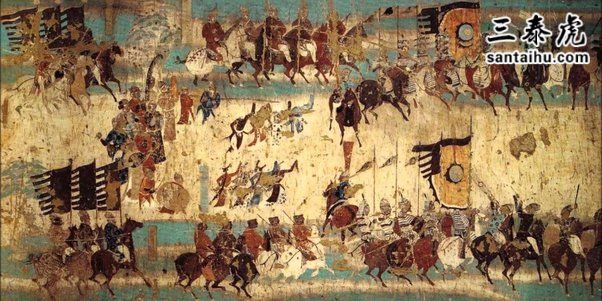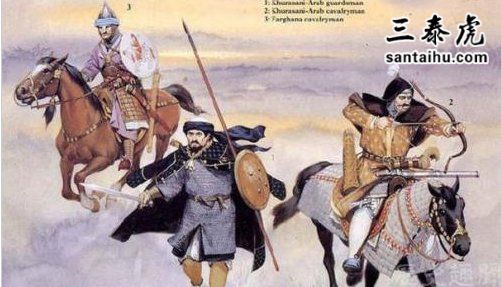Why is the Battle of Talas historically significant?
为什么怛罗斯之战具有重要的历史意义?
以下是Quora网友的评论:
Mert Toker
Battle of Talas is historically significant. It is true that it looks like border clashes between major powers of the era however the political consequences of the battle turn the event into a historically significant event…The battle of Talas itself decided very little, but its timing was critical. It is the first and last battle Arabs and Chinese had and they defined their borders of influence. The peace and defined borders contributed to human civilization at the end. The political consequences were great.
怛罗斯之战是一场非常重要的历史战役。这场战役看似只是当时大国之间的边境冲突,但这场战争的政治后果使其变成了具有历史意义的事件……怛罗斯之战本身的影响力有限,但时机却非常重要。这是阿拉伯人和中国人之间第一次也是最后一次战争,划定了彼此的势力范围。地区的和平和划定的边境为人类文明做出了巨大贡献,具有深远的政治影响。
The relations between the Arabic world and China is evidenced with the exchange of envoys especially during the third Caliph (AlSaadi, 2012). The Tang’s interest however was not just limited to the trading business. They were also interested in enlarging their geographical territory into Central Asia which was a strategic location for business and tremendously rich at that time. Their expansion was halted when they lost in the Battle of Talas in 751 C.E to the Muslims army and its allies.
史实证明,阿拉伯世界和中国之间通过互派使节进行外交,尤其是在第三任哈里发统治时期。唐朝并不满足于贸易往来,他们希望将大唐的地理版图扩展到中亚地区,因为中亚是商贸活动的战略要地,非常富裕。公元751年,唐朝军队在怛罗斯之战中败给穆 斯林军队及其盟友,扩张之势就此打住。
The Battle of Talas significantly contributed to the positive climate changes in the political fortunes of the rival sides and economic development along the Silk Road (Al-Saadi, 2012). In addition to that, Battle of Talas was the key event in the history of paper making in Abbasids dynasty. A year after the Battle of Talas, the Abbasid’s caliphal-Saffah sent envoys to China. This brings about change in their relationship from military and political struggle to a peaceful coexstence and corporation in economics and trading. The good relationships between these two empires allowed knowledge exchange and Muslim merchants conducted trade in various cities of China such as Guangzhou, Quanzhou and Yangzhou. Source: Explorations on the Abbasids Political Culture in Pursuit of Sustainable System of Governance in the Muslim World
怛罗斯之战极大地促进了敌对双方政治命运的改变和丝绸之路沿线的经济发展。此外,怛罗斯之战是阿巴斯王朝造纸史上的重大事件。怛罗斯之战一年后,阿巴斯王朝的哈里发萨法派使节到中国。这使得两国关系从军事和政治斗争转化为和平共处和经济贸易合作。这两个帝国之间的良好关系促进了知识交流,穆 斯林商人在中国的广州、泉州、扬州等各个城市进行贸易。来源:《穆 斯林世界追求可持续治理体系的阿巴斯政治文化探索》
Chinese sources speak about the incursion of Arab and Persian pirates (Da-Shi) into Canton in 758 and the massacre by the Chinese of the foreigners, which resulted there from in 762. All throughout this period, i.e., 7-8 th centuries, commercial ties did exst between China and the Abbasid world, which was in fact a continuation of the previous relations between China and the Sassanid Empire. It is noteworthy that since the Arabs had little experience in those days in the circumnavigation of Arabia and India into the China Sea, it was the Persians who played the major role in these trade routes, even after the takeover of that commerce by the Arabs. Arabs, especially from South Arabia, learned the seafaring trade and gradually became dominant in the Far Eastern waters from the 10th century onwards. Expectedly, trade relations between China and the Islamic Empire reached their climax during the 9th century when the prevailing stability in both permitted this sort of international exchange. Source:Unesco
中国的史料提到758年阿拉伯和波斯海盗曾入侵广东并导致762年中国人对外国人进行了大屠杀。在这一时期,即7-8世纪,中国与阿巴斯世界之间确实存在着商业联系,这也正是中国与萨珊帝国之间关系的延续。
值得注意的是,由于阿拉伯人在当时几乎没有穿越阿拉伯和印度进入中国海的经验,所以在这些贸易路线上发挥主要作用的是波斯人,即便在阿拉伯人接管了这条贸易路线之后也依然如此。阿拉伯人,尤其是来自南阿拉伯地区的阿拉伯人,学会了航海贸易,并从10世纪开始逐步称霸远东水域。中国和伊 斯兰帝国之间的贸易关系在9世纪达到了巅峰,当时两国国力稳定,有能力进行国际交流。资料来源:联合国教科文组织
The battle on the Talas River was an important historical battle that occurred in July, 751 on the Talas River (presumably in the border of modern Kazakhstan and Kyrgyzstan in central Asia) near the city of Atlaha between the troops of the Abbasid Caliphate and Turgesh Kaganate on the one hand, and the army of Tang China, for control of Central Asia and for access to the very lucrative Silk Road. The result of the battle was a great victory for the Abbasid caliphate with their ally Turgesh Kaganate.
怛罗斯河战役是一场重要的历史战役,发生在751年7月,爆发于阿特拉哈城附近的怛罗斯河,大概在现代中亚哈萨克斯坦和吉尔吉斯斯坦的边境,一方是阿巴斯哈里发和吐尔格什军队,另一方是中国唐朝的军队,双方争夺中亚的控制权并力图掌控一本万利的丝绸之路。战争的结果是阿巴斯哈里发和盟友吐尔格什获得了巨大的胜利。
By the mid-740s, the Tang controlled trade routes both north and south of the Tianshan mountains in modern Kyrgyzstan. Gao ianzhi (a Korean general serving the Tang) had been engaged in a series of campaigns to drive the Tibans out of the Pamir mountains when a quarrel between the Chabish of Tashkent and Ilkhshid of Fergana erupted (Soucek writes that the ruler of Tashkent used the Turkish title Chabish while the ruler of Fergana used the Iranian title Ilkhshid). The leader of Tashkent allied with the remnants of a tribal confederacy the Chinese had crushed years earlier, so the leader of Fergana called on the Tang for help. Gao captured Tashkent and its leader while his army sacked the city in 750. Eventually Gao executed the Chabish, whose son fled to the Abbasids in Samarkand for help.
740年代中期,唐朝控制了天山南北的贸易路线。唐朝的朝鲜族将领高仙芝参加了多场将藏 人赶出帕米尔山脉的战役,塔什干的首领查比什和费尔干纳的首领伊尔赫什德之间不和(苏切克写道,塔什干的统治者使用土耳其语的称号查比什,而费尔干纳的统治者使用伊朗语的称号伊尔赫什德)。塔什干的首领与多年前被中国镇压的部落联盟的残余势力结盟,因此费尔干纳的首领向唐朝求援。750年,高仙芝带领荡平塔什干,占领了塔什干及其首领。最终高仙芝处决了查比什,他的儿子逃到撒马尔罕的阿巴斯寻求帮助。
The governor of Samarkand, Ziyad ibn Salih, asked Abu Muslim (the Abbasid general who had led the revolt in Merv) for reinforcements and after they arrived set off in the direction of Chinese territory. The two armies met along the Talas river. By some accounts, both sides fielded armies in excess of 100,000 troops each (other estimates are significantly lower). The Tang were reinforced by the Karluks (Qarluqs), a Turkic Central Asian tribal confederacy, a fact which would prove unexpectedly decisive. The Karluks switched sides and attacked the rear of the Tang army as the Abbasids attacked the front. Gao managed to escape but with only a fraction of his army.
撒马尔罕总督齐亚德·伊本·萨利赫请求阿布·msl(领导梅尔夫起义的阿巴斯将军)增援,他们朝中国方向发兵。两军在塔拉斯河相遇。有些专家认为,双方都派出了超过10万人的军队(也有人认为人数远不及此)。唐朝得到了中亚突厥部落联盟—— 葛逻禄的支持,却招来了出乎意料的决定性后果。当阿巴斯人进攻唐军前阵时, 葛逻禄突然倒戈,攻打唐军的后方军队。高仙芝成功逃脱,但只带走了一小队人马,军队元气大伤。
However, that it was not Gao’s defeat at Talas that forced the Chinese to retreat from Central Asia. Instead, before Gao could return to his unfinished business with the Abbasids, the An Lushan rebellion shattered Tang control of the west. “The An Lushan rebellion in the Tang homelands necessitated a pullback from Tang outposts in injiang,” Although the Tang dynasty survived the An Lushan rebellion, it would never extend power as far west as injiang.”
但中国被迫撤出中亚并非是因为高仙芝在这场怛罗斯之战中的失败。相反,在高仙芝做好再次攻打阿巴斯的准备前,安禄山的叛乱结束了唐朝对西部的控制。爆发于大唐境内的安史之乱迫使唐朝从新 疆的前哨撤军,“虽然唐朝最终平定了安史之乱,但已无力再将势力版图扩张到新 疆西部。”
The battle of Talas, lacking any greater imminent strategic importance, is nonetheless a key piece of Central Asia’s history and provides a crucial lesson that in matters of war and empire, timing is everything. Source: (The diplomat)


怛罗斯之战虽然并没有关乎民族存亡的战略重要性,但却是中亚历史上的一个重要事件,也是一个重要的教训:在战争和帝国的问题上,时机就是一切。来源:(外交官)
Some consequnces of the battle:
这场战争的一些后果:
The result of the battle was very consequential, and was the start of the spread of Islam in Maverannahr and Central Asia, as well as Arab influence on the Great Silk Road in the region. Cultural exchange was initiated because after the battle, there were great achievements in the east, like paper accessible to the middle east and later Europe, sparking a great change of intellectual learning and influenced great advances in science and the arts.
这场战争的结果是非常重要的,标志着伊 斯兰教在马弗拉纳尔和中亚传播的开始,也标志着阿拉伯人对该地区丝绸之路的影响的开始。文化交流自此开始,是因为东方文明在这场战争之后取得了巨大的成就,比如纸张流入了中东和后来的欧洲,引发了知识分子学习的潮流,影响了科学和艺术的巨大进步。
Another major consequence is that Islamication of Turks.. Turkic races were looking for a religion to unite them and provide a type of constitution among tribes. Like Christianity offered a common way of living in Europe, Turks embraced Islam in time (most of the time voluntarily) and the history changed on long run. They had problems with Chinese therefore could not adapt their religion in masses… Arabs offered an alternative which was similar to old Turkish religion in many ways, ‘’Tengrism’’ …
另一个重要后果就是突厥人的伊 斯兰化。突厥人恰好正在寻找一种可以团结民众的宗教,希望在部落之间制订法律体系。就像基督教在欧洲推行的生活方式一样,突厥人接受了伊 斯兰教(大多数时候是自愿的),最后历史发生了变化。阿拉伯人给他们带去了一个在很多方面都和古老的土耳其宗教“腾格里”类似的宗教。
A new religion would unite Turkish tribes and provide a united identity. A Muslim identity… After the Turkish take over of Abbasi caliphate, Seljuks, Ottomans, Timurids continued the policy of jihad and Turks expanded their territories up to Vienna in West. Battle of Talas in this sense maybe regarded as a historically important event which showed Central Asian Turks a political and religious alternative against Chinese… Furthermore it provided a boundary between Chinese influence and Arab influence…
新的宗教可以联合突厥各部落,并赋予民众统一的身份认同,穆 斯林身份……在突厥接管阿巴西哈里发之后,塞尔柱人、奥斯曼人、帖木儿人继续实施圣战政策,突厥人将领土扩张到了西方的维也纳。在这个意义上,怛罗斯之战也可视为一个重要的历史事件,它向中亚突厥人展示了和中国不同的政治和宗教选择…此外,它在中国和阿拉伯的两股势力之间竖起了屏障…
The Abbasids were in power from 750 to 1258 C.E. A new capital was established and Baghdad became the centre of the world; a cultured city of political weight. Meanwhile, the Abbasid rule brought a new dimension. This time, the Arabs became underdog as Persians and the Turks influenced the political system and changed the political and cultural fields of the Abbasid Empire (Elsohemy, 2004). Source: Mediterranean Journal of Social Sciences
阿巴斯王朝从公元750年持续到1258年,新的首都建立后,巴格达成为了世界的中心;这是一个拥有政治影响力的文明城市。与此同时,阿巴斯王朝的统治带来了一个新的局面。这一次,由于波斯人和突厥人对政治体系的影响,改变了阿巴斯帝国的政治和文化局面,阿拉伯人第一次失势。资料来源:地中海社会科学杂志
Jason Li
It provides a convenient marker on the timeline to mark the decline of Tang/Chinese influence over central Asia.
The battle itself was of little strategic consequence, other than that Chinese POWs transferred paper-making technology into central Asia and its consequences elaborated in Usman Qazi's answer. The amount of Tang troops (10,000 strong) involved in the battle was relatively minor when compared to the entirety of the Tang army (over half a million), and the loss was due to the last-minute unexpected defection of allied Karluks forces. The Tang commander Gao ianzhi retreated to safety, and immediately began preparations for a counter-offensive.
这场战争在历史年表中标记着唐朝/中国对中亚的影响力走向衰落。
这场战争本身并不具备太大的战略意义,不过中国战俘将造纸技术传入了中亚,乌斯曼·卡齐的回答中对其带来的结果进行了详细的说明。与大唐军队的总数(超过50万人)相比,参与这场战争的唐军兵力(10000精兵)实在很少,而且唐军的失败是因为盟军葛逻禄军队在最后一刻反水倒戈。唐军统帅高仙芝撤退到安全地带,立即开始准备反攻。
However, that counter-offensive never happened due to the An Lushan Rebellion, which lasting over 7 years with an estimate loss of 36 million people according to Steven Pinker's book The Better Angels of Our Nature. This rebellion/civil war was the fundamental cause to Tang's strategic loss of central Asia. Had it never happened, the Battle of Talas would probably be forgotten as yet another one of hundreds of border conflicts between two Asian empires.
但是因为安禄山的叛乱阻碍了高仙芝的反攻。根据史蒂文·平克的《人性中的善良天使》一书,安史之乱持续了7年多,据估计3600万人因此丧生。这场内乱是大唐在战略上失去中亚的根本原因。如果未曾爆发过安史之乱,人们很可能只会把怛罗斯之战看做两个亚洲帝国之间发生过的无数次边境冲突之一,早已被遗忘在历史的长河中。
此文由 三泰虎 编辑,未经允许不得转载!:首页 > 问答 » 唐朝和阿拉伯的战争,为什么说怛罗斯之战具有重要的历史意义
 如果未来15年电动汽车在中国普及开来,沙特阿拉伯的经济将会变成什么样
如果未来15年电动汽车在中国普及开来,沙特阿拉伯的经济将会变成什么样 拜登应该允许沙特阿拉伯加入金砖组织吗
拜登应该允许沙特阿拉伯加入金砖组织吗